Report: Monetary Policy and the Changing Financial Landscape
VerifiedAdded on 2023/06/03
|6
|846
|264
Report
AI Summary
This report delves into the realm of monetary policy and its interplay with the evolving financial landscape, specifically focusing on the United Kingdom. It explores the operational dynamics of financial institutions, markets, and the broader financial system, emphasizing their roles in facilitating economic exchange and growth. The report provides an overview of the UK's economic expansion, demographic influences, and the impact of technological and ethical considerations on financial practices. Furthermore, the report provides an analysis of inflation targeting as a monetary policy strategy, comparing and contrasting its implementation in the UK, Canada, and New Zealand. It also includes the advantages and disadvantages of inflation targeting, referencing the provided graph which reflects the changes in inflation targeting of the UK, Canada, and New Zealand. The report concludes by referencing key sources used in the analysis.
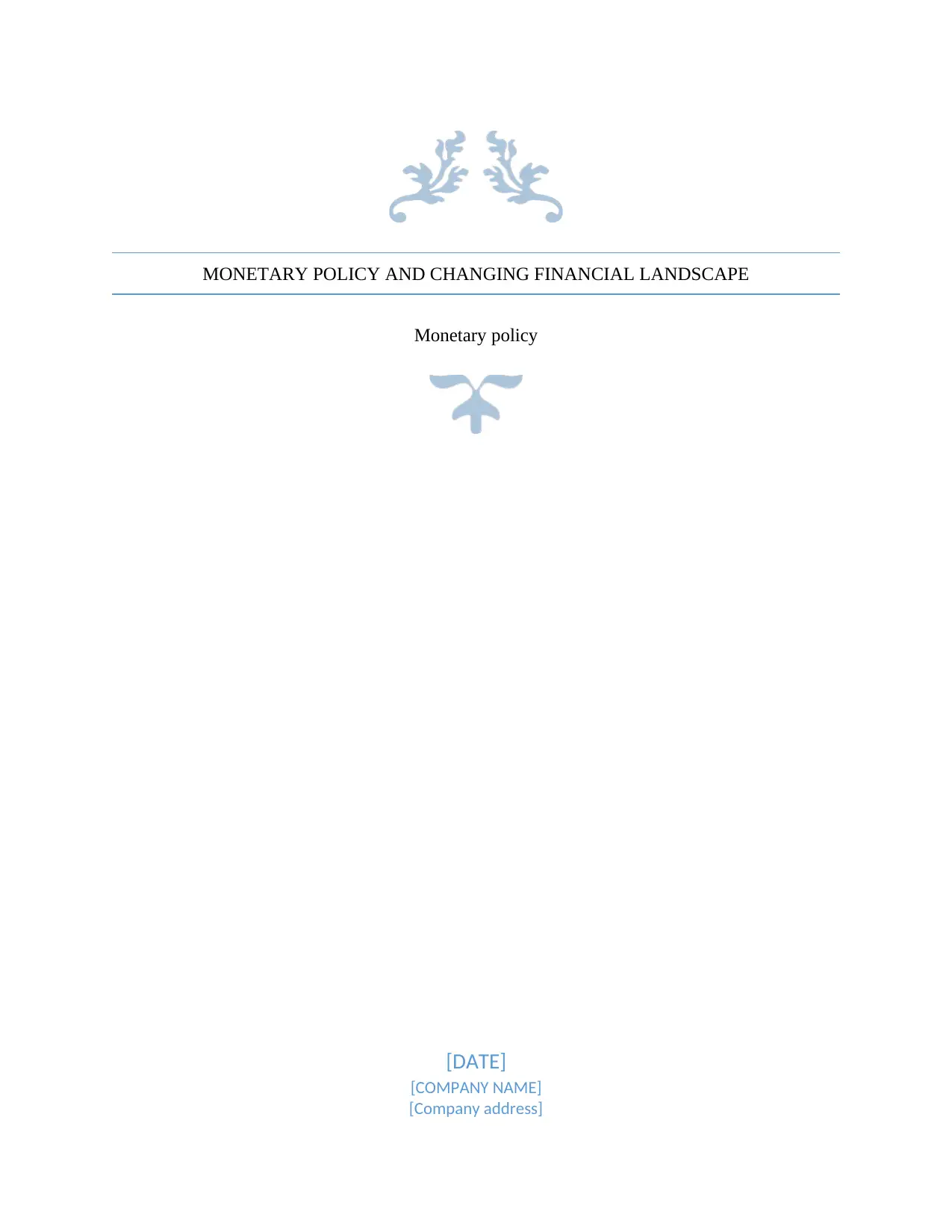
MONETARY POLICY AND CHANGING FINANCIAL LANDSCAPE
Monetary policy
[DATE]
[COMPANY NAME]
[Company address]
Monetary policy
[DATE]
[COMPANY NAME]
[Company address]
Paraphrase This Document
Need a fresh take? Get an instant paraphrase of this document with our AI Paraphraser
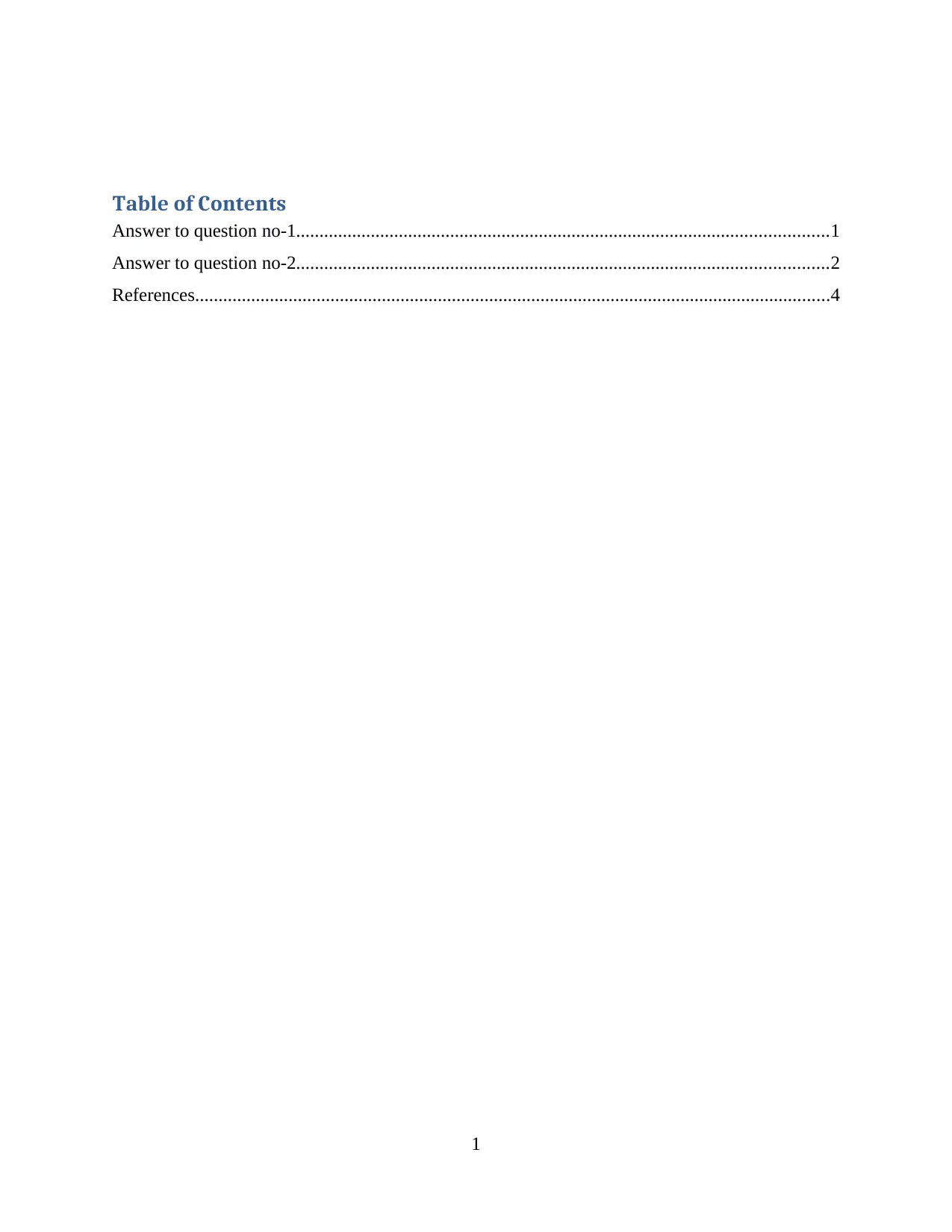
Table of Contents
Answer to question no-1..................................................................................................................1
Answer to question no-2..................................................................................................................2
References........................................................................................................................................4
1
Answer to question no-1..................................................................................................................1
Answer to question no-2..................................................................................................................2
References........................................................................................................................................4
1
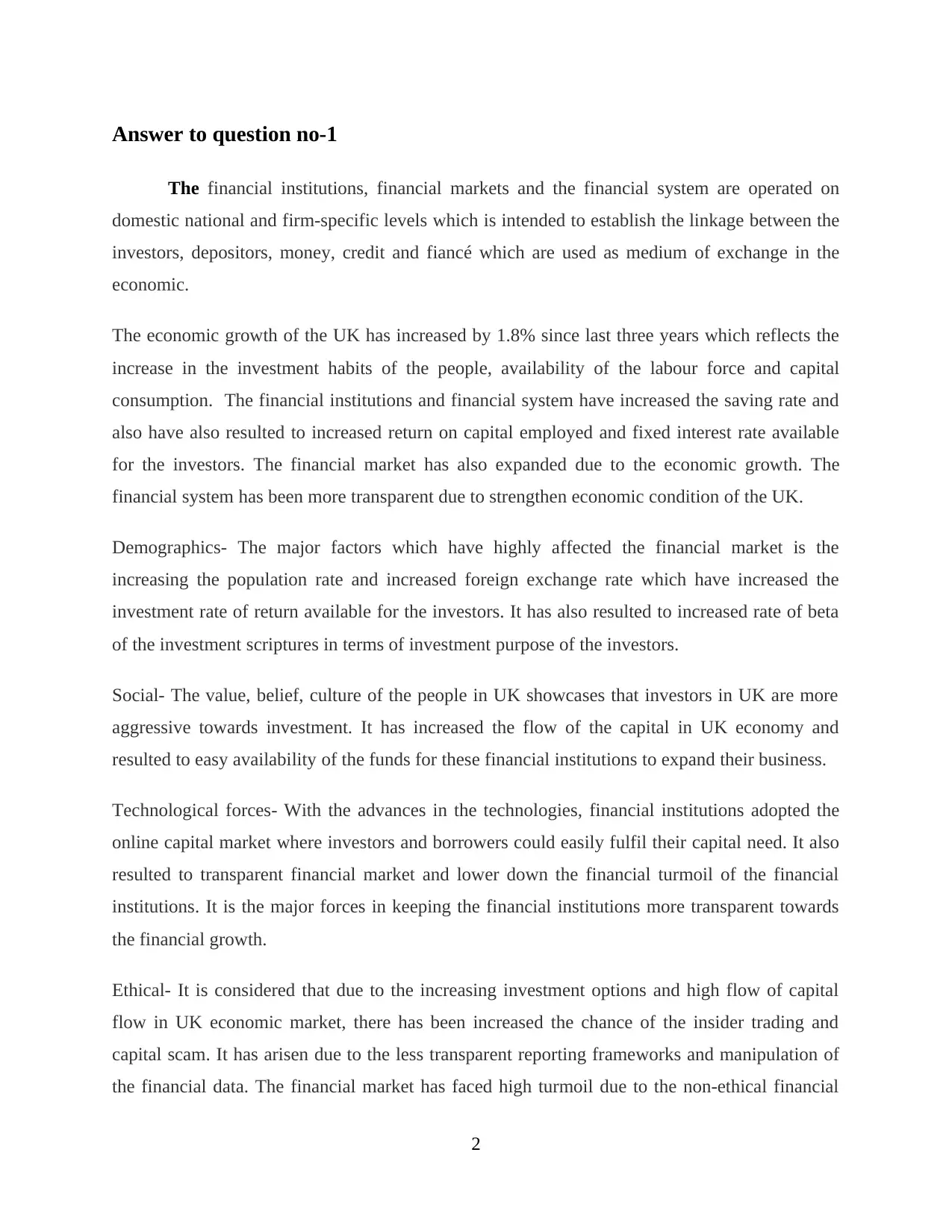
Answer to question no-1
The financial institutions, financial markets and the financial system are operated on
domestic national and firm-specific levels which is intended to establish the linkage between the
investors, depositors, money, credit and fiancé which are used as medium of exchange in the
economic.
The economic growth of the UK has increased by 1.8% since last three years which reflects the
increase in the investment habits of the people, availability of the labour force and capital
consumption. The financial institutions and financial system have increased the saving rate and
also have also resulted to increased return on capital employed and fixed interest rate available
for the investors. The financial market has also expanded due to the economic growth. The
financial system has been more transparent due to strengthen economic condition of the UK.
Demographics- The major factors which have highly affected the financial market is the
increasing the population rate and increased foreign exchange rate which have increased the
investment rate of return available for the investors. It has also resulted to increased rate of beta
of the investment scriptures in terms of investment purpose of the investors.
Social- The value, belief, culture of the people in UK showcases that investors in UK are more
aggressive towards investment. It has increased the flow of the capital in UK economy and
resulted to easy availability of the funds for these financial institutions to expand their business.
Technological forces- With the advances in the technologies, financial institutions adopted the
online capital market where investors and borrowers could easily fulfil their capital need. It also
resulted to transparent financial market and lower down the financial turmoil of the financial
institutions. It is the major forces in keeping the financial institutions more transparent towards
the financial growth.
Ethical- It is considered that due to the increasing investment options and high flow of capital
flow in UK economic market, there has been increased the chance of the insider trading and
capital scam. It has arisen due to the less transparent reporting frameworks and manipulation of
the financial data. The financial market has faced high turmoil due to the non-ethical financial
2
The financial institutions, financial markets and the financial system are operated on
domestic national and firm-specific levels which is intended to establish the linkage between the
investors, depositors, money, credit and fiancé which are used as medium of exchange in the
economic.
The economic growth of the UK has increased by 1.8% since last three years which reflects the
increase in the investment habits of the people, availability of the labour force and capital
consumption. The financial institutions and financial system have increased the saving rate and
also have also resulted to increased return on capital employed and fixed interest rate available
for the investors. The financial market has also expanded due to the economic growth. The
financial system has been more transparent due to strengthen economic condition of the UK.
Demographics- The major factors which have highly affected the financial market is the
increasing the population rate and increased foreign exchange rate which have increased the
investment rate of return available for the investors. It has also resulted to increased rate of beta
of the investment scriptures in terms of investment purpose of the investors.
Social- The value, belief, culture of the people in UK showcases that investors in UK are more
aggressive towards investment. It has increased the flow of the capital in UK economy and
resulted to easy availability of the funds for these financial institutions to expand their business.
Technological forces- With the advances in the technologies, financial institutions adopted the
online capital market where investors and borrowers could easily fulfil their capital need. It also
resulted to transparent financial market and lower down the financial turmoil of the financial
institutions. It is the major forces in keeping the financial institutions more transparent towards
the financial growth.
Ethical- It is considered that due to the increasing investment options and high flow of capital
flow in UK economic market, there has been increased the chance of the insider trading and
capital scam. It has arisen due to the less transparent reporting frameworks and manipulation of
the financial data. The financial market has faced high turmoil due to the non-ethical financial
2
⊘ This is a preview!⊘
Do you want full access?
Subscribe today to unlock all pages.

Trusted by 1+ million students worldwide
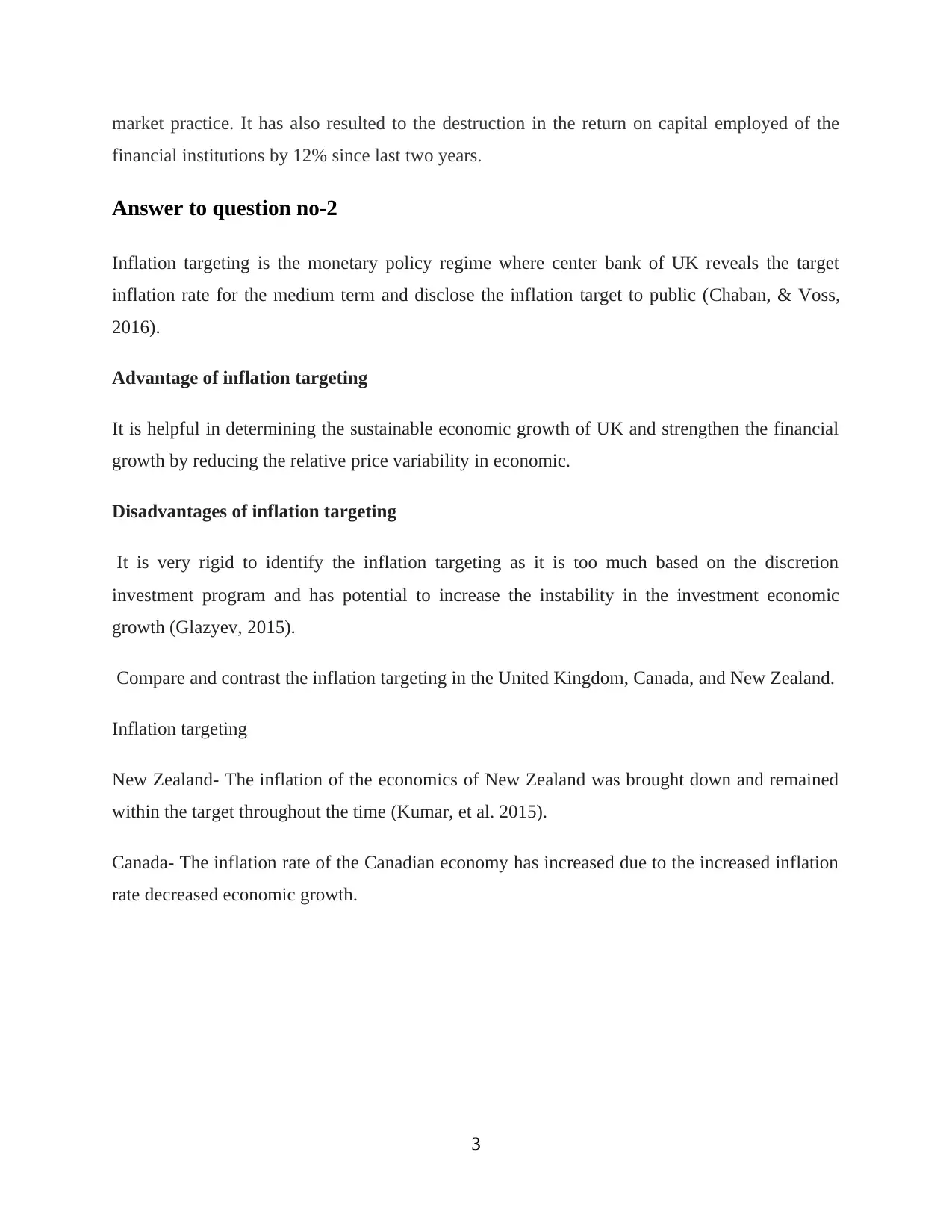
market practice. It has also resulted to the destruction in the return on capital employed of the
financial institutions by 12% since last two years.
Answer to question no-2
Inflation targeting is the monetary policy regime where center bank of UK reveals the target
inflation rate for the medium term and disclose the inflation target to public (Chaban, & Voss,
2016).
Advantage of inflation targeting
It is helpful in determining the sustainable economic growth of UK and strengthen the financial
growth by reducing the relative price variability in economic.
Disadvantages of inflation targeting
It is very rigid to identify the inflation targeting as it is too much based on the discretion
investment program and has potential to increase the instability in the investment economic
growth (Glazyev, 2015).
Compare and contrast the inflation targeting in the United Kingdom, Canada, and New Zealand.
Inflation targeting
New Zealand- The inflation of the economics of New Zealand was brought down and remained
within the target throughout the time (Kumar, et al. 2015).
Canada- The inflation rate of the Canadian economy has increased due to the increased inflation
rate decreased economic growth.
3
financial institutions by 12% since last two years.
Answer to question no-2
Inflation targeting is the monetary policy regime where center bank of UK reveals the target
inflation rate for the medium term and disclose the inflation target to public (Chaban, & Voss,
2016).
Advantage of inflation targeting
It is helpful in determining the sustainable economic growth of UK and strengthen the financial
growth by reducing the relative price variability in economic.
Disadvantages of inflation targeting
It is very rigid to identify the inflation targeting as it is too much based on the discretion
investment program and has potential to increase the instability in the investment economic
growth (Glazyev, 2015).
Compare and contrast the inflation targeting in the United Kingdom, Canada, and New Zealand.
Inflation targeting
New Zealand- The inflation of the economics of New Zealand was brought down and remained
within the target throughout the time (Kumar, et al. 2015).
Canada- The inflation rate of the Canadian economy has increased due to the increased inflation
rate decreased economic growth.
3
Paraphrase This Document
Need a fresh take? Get an instant paraphrase of this document with our AI Paraphraser
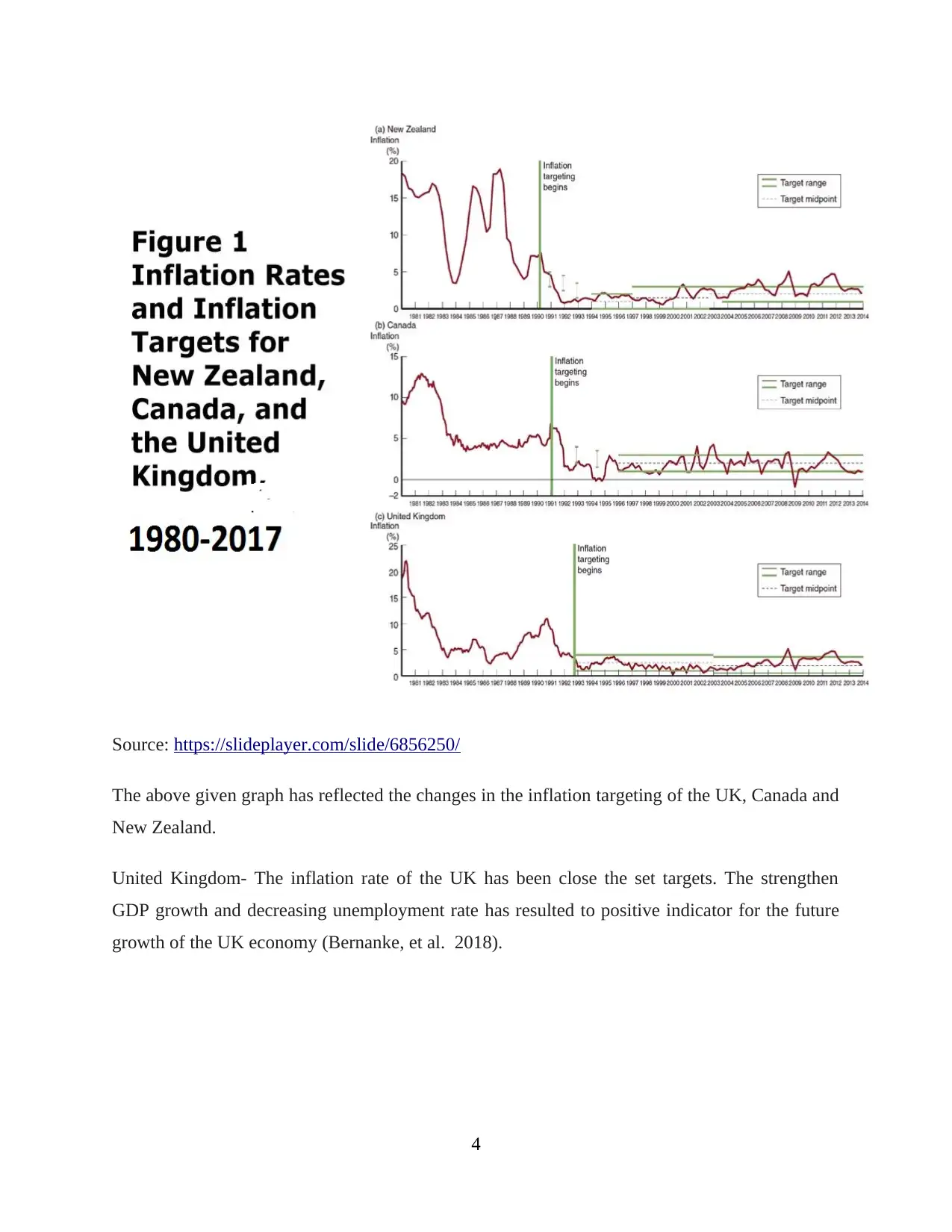
Source: https://slideplayer.com/slide/6856250/
The above given graph has reflected the changes in the inflation targeting of the UK, Canada and
New Zealand.
United Kingdom- The inflation rate of the UK has been close the set targets. The strengthen
GDP growth and decreasing unemployment rate has resulted to positive indicator for the future
growth of the UK economy (Bernanke, et al. 2018).
4
The above given graph has reflected the changes in the inflation targeting of the UK, Canada and
New Zealand.
United Kingdom- The inflation rate of the UK has been close the set targets. The strengthen
GDP growth and decreasing unemployment rate has resulted to positive indicator for the future
growth of the UK economy (Bernanke, et al. 2018).
4
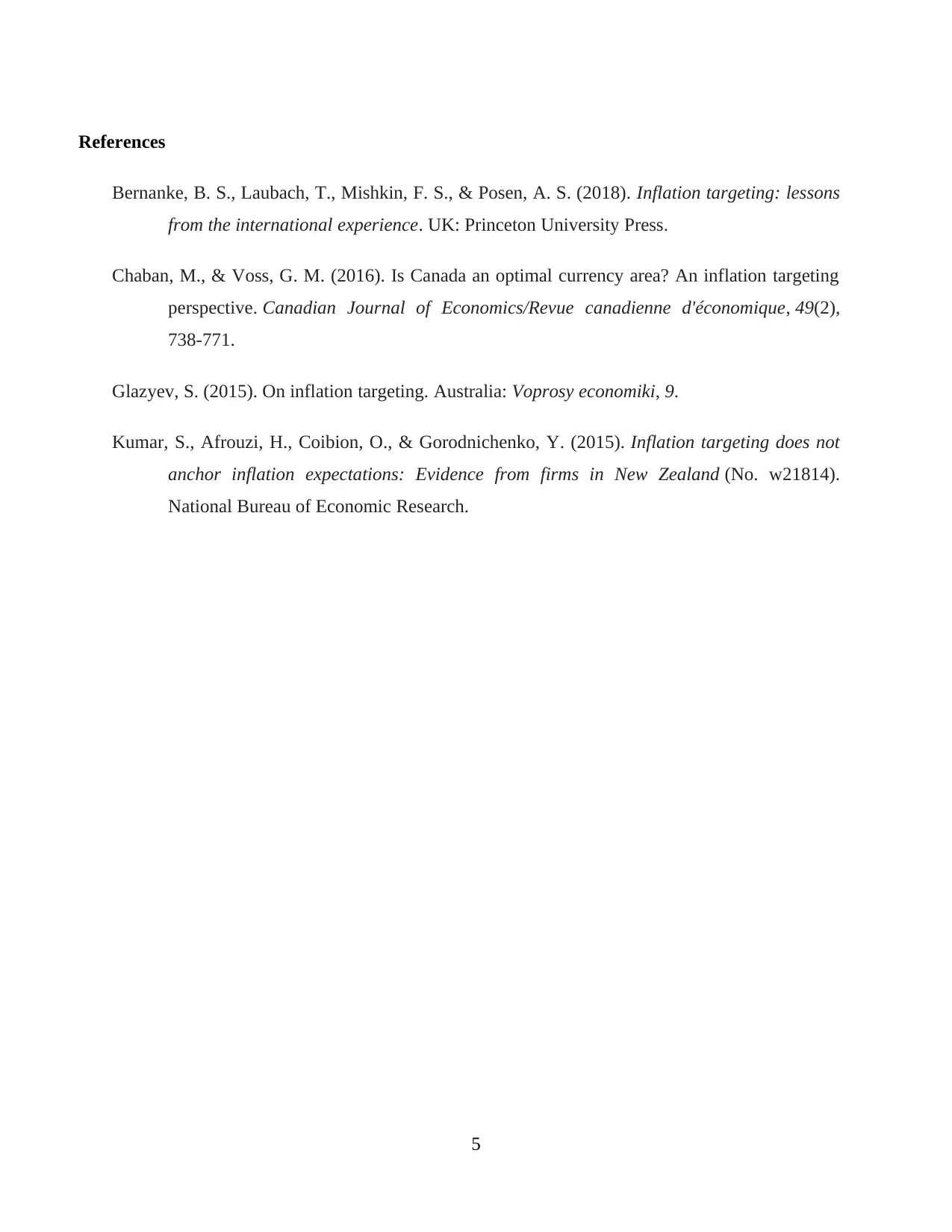
References
Bernanke, B. S., Laubach, T., Mishkin, F. S., & Posen, A. S. (2018). Inflation targeting: lessons
from the international experience. UK: Princeton University Press.
Chaban, M., & Voss, G. M. (2016). Is Canada an optimal currency area? An inflation targeting
perspective. Canadian Journal of Economics/Revue canadienne d'économique, 49(2),
738-771.
Glazyev, S. (2015). On inflation targeting. Australia: Voprosy economiki, 9.
Kumar, S., Afrouzi, H., Coibion, O., & Gorodnichenko, Y. (2015). Inflation targeting does not
anchor inflation expectations: Evidence from firms in New Zealand (No. w21814).
National Bureau of Economic Research.
5
Bernanke, B. S., Laubach, T., Mishkin, F. S., & Posen, A. S. (2018). Inflation targeting: lessons
from the international experience. UK: Princeton University Press.
Chaban, M., & Voss, G. M. (2016). Is Canada an optimal currency area? An inflation targeting
perspective. Canadian Journal of Economics/Revue canadienne d'économique, 49(2),
738-771.
Glazyev, S. (2015). On inflation targeting. Australia: Voprosy economiki, 9.
Kumar, S., Afrouzi, H., Coibion, O., & Gorodnichenko, Y. (2015). Inflation targeting does not
anchor inflation expectations: Evidence from firms in New Zealand (No. w21814).
National Bureau of Economic Research.
5
⊘ This is a preview!⊘
Do you want full access?
Subscribe today to unlock all pages.

Trusted by 1+ million students worldwide
1 out of 6
Related Documents
Your All-in-One AI-Powered Toolkit for Academic Success.
+13062052269
info@desklib.com
Available 24*7 on WhatsApp / Email
![[object Object]](/_next/static/media/star-bottom.7253800d.svg)
Unlock your academic potential
Copyright © 2020–2026 A2Z Services. All Rights Reserved. Developed and managed by ZUCOL.





